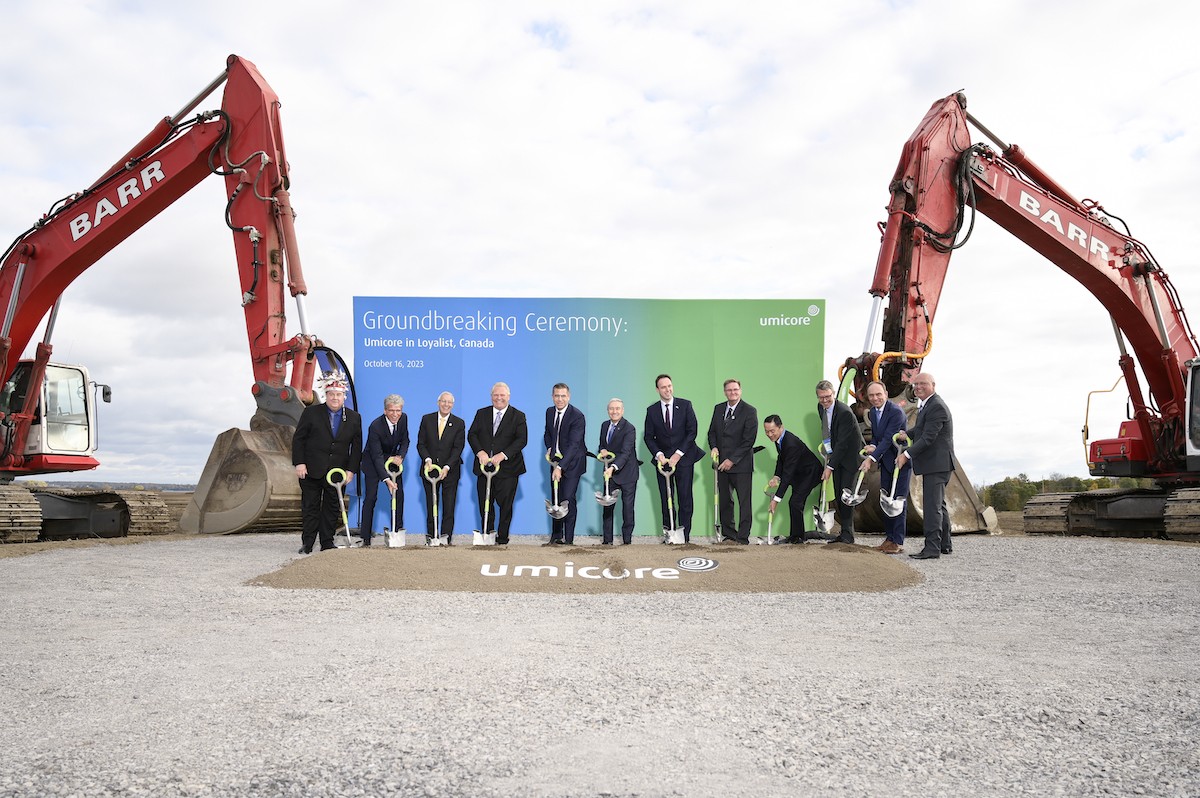Umicore pauses $2.8B EV battery plant work in Ontario
Company officials stated that they are reviewing expansion plans in North America as EV demand has sharply declined.

(2023/10/04) WESTPORT, ON – Ontario Maple Syrup Producers Association director, and Maple tree farmer Randal Goodfellow stands in front of many of his Maple trees. Photograph by: James Paddle-Grant
Key Takeaways:
- Umicore has paused the $2.8 billion project for a battery-materials manufacturing plant in Ontario and is reviewing its North American expansion plans.
- This decision is influenced by declining revenues, including the loss of an anticipated contract with a Chinese manufacturer and faster-than-expected conclusion of current contracts. The review results will be announced in the first quarter of next year.
- The Canadian and Ontario governments had pledged substantial financial support for the project, with contributions of up to $551.3 million and $424.6 million, respectively. The project was expected to generate around 1,000 construction jobs and several hundred highly skilled operational positions.
The Whole Story:
Belgian company Umicore announced on Friday that it is pausing its $2.8-billion battery-materials manufacturing plant project in Ontario.
The company, which operates in Europe and Asia, has delayed construction spending on the Loyalist, Ontario plant and initiated a review of its North American expansion plans. The results of this review will be made public in the first quarter of next year.
This decision comes as the company faces declining revenues. Last month, Umicore disclosed that an anticipated contract with a Chinese manufacturer would not come to fruition, and that current contracts were “tailing off faster than anticipated.”
Umicore officials explained that a a sharp slowdown in the growth of demand for EVs is impacting the entire supply chain and customers’ demand projections for Umicore’s battery materials have steeply declined. They expect that 2024 volumes for battery materials could be equal or slightly lower than last year.
“In recent months, short- and medium-term growth projections for the electric vehicles market have been scaled back substantially, significantly affecting Umicore’s Battery Materials business,” said Bart Sap, Umicore CEO. “Today, we share the elements of how we are adjusting to this new reality. The large impairment of our battery materials assets is painful and reflects the changed situation as we see it today. In the coming months, we will continue to thoroughly reassess our battery materials activities, with energy and an open mind, always in close alignment with our customers and partners.”
The updated guidance reflects a reduction in cathode materials sales which is driven by:
- Volumes from legacy contracts coming to an end faster than anticipated;
- A delay in the anticipated volume ramp-up of new contracts in Europe as customers are scaling back their electrification ramp-up plans. The take-or-pay mechanisms of these contracts come in gradually during ramp-up;
- The volumes for a Chinese battery OEM not materializing in 2024.
Crews broke ground on the project in October last year. Umicore stated that the facility would combine the production of precursor (pCAM) and CAM, the most critical components for a rechargeable battery’s performance. By doing this, the production facility will complete the “missing link” in North America’s EV battery value chain, from natural resources to EVs. The plant will be fully equipped to produce advanced high-nickel technologies and is prepared for future battery chemistries, including manganese-rich HLM and solid-state batteries.
The project received substantial support from the government. Based on the full scope of the envisioned project, the Government of Canada is contributing up to $551.3 million, while Ontario is supporting the project with up to $424.6 million.
During the construction phase, the plant was expected to generate approximately 1,000 employment opportunities, while several hundred highly skilled positions would be created in operations.
According to report this summer by Goldman Sachs, the global sales momentum for EVs is slowing, with hybrids (HEVs) and plug-in hybrids (PHEVs) becoming more competitive. Key factors contributing to this slowdown include rising concerns about EV capital costs, uncertainty around government policies, and a shortage of rapid-charging stations.
